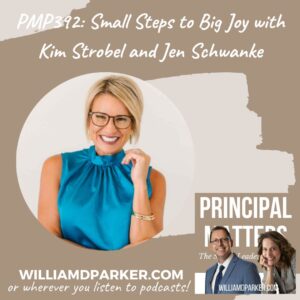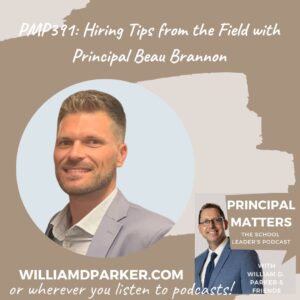Podcast: Play in new window | Download
Recently, several questions came from Principal Matters community members. This week, Jen Schwanke, principal and author, joined me to answer several questions from principals or aspiring principals.

Here are a three questions we take time to discuss and respond to:
Question 1: Finding my first principal position…
Hello! I have just completed my masters program to be an administrator for a school and I was curious what your advice would be on how I can be noticed more during the application process. I’ve applied to quite a few places and never heard anything back. So all in all, what would your advice be to any teacher leaders seeking out their first admin job?
–Question from an aspiring school leader
Jen’s ideas:
- Do the math. Schools only have selected openings for administrators. Just because you haven’t been considered may be a reflection on the limited number of openings availalbe.
- Apply and network. Don’t stop reaching out and applying. And connect with other school leaders. Those relationships pay dividends later when openings occur.
- Go where you’re wanted. You want to be in a place that is a good fit and where you will be valued. If your current district is not that place, consider a move.
- Don’t let desperation lead you. Make the right choice for you and your family. A bad leadership position is worse than no position at all.
- Think of your negotiables and non-negotiables (moving, grade level switch, pay cut) and don’t waver.
Will’s ideas:
- Lead where you are. Don’t forget the best way to interview for a future opening is by leading and excelling where you are right now.
- Be an incredible teacher/teacher-leader. Principals are not made, they are developed. And your actions as a superb instructor and leader among teachers sets the tone for your future work as an administrator.
- Get the word out. Tell others your looking. My first opening came when a friend saw a post for an assistant opening in a neighboring district and told me about it.
- Interview anyway. One of the best ways to train for a future opening is interviewing – even for positions you may not get. When I moved from assistant principal to principal, I interviewed in locations where I was not offered the position before I found the right fit.
Question 2: Student discipline…
I’m struggling to want to stay consistent in disciplining students largely because I know that they are acting out due to what’s going on at home. I find that my heart is going out to these kids, and I want to show them some grace. It’s draining having to suspend the same kid yet again when you know there’s no follow through at home. At the same time, I can’t overlook these behaviors. I also feel like teachers come to me regarding my “frequent flyers” expecting me to be able to “fix” them. I guess I’m still searching for my magic wand. Any suggestions or words of advice? Does discipline from the AP role ever get easier?
–Question from an Assistant Principal
Jen’s ideas:
- I don’t think it gets easier, and if it does, that’s because you’ve stopped caring, or gotten numb.
- Just do the next right thing.
- Follow your relationships (with kids, families, teachers).
- Think of alternatives. You should be working on a menu of options for student discipline, not just a one-size fits all approach.
- Teach teachers. Sometimes discipline can begin and end in the classroom. Teachers may need instruction in how to do this so issues don’t escalate to office referrals.
- Explain without wavering. It is still your responsiblity to implement policy. You can do this in a compassionate way and still be consistent.
Will’s ideas:
- Embrace the tension of consistency and compassion. They go hand in hand. But you can’t have one without the other.
- Consider student contracts. With frequent-flyers, it is sometimes helpful to draft an agreement that spells out ahead of time the consequences and rewards for behaviors.
- Bring a team together. Don’t manage student behavior alone. Invite a counselor, teachers, or parents to the table. You’ll find more creative solutions when you do.
- Sometimes it’s as simple (or hard) as asking yourself, “What would a great leader do?” And do that.
- Follow policy. It’s your responbility to be consistent. This actually allows you to be creative and nuanced within the parameters of your policies. If policies are too stringent, work on changing them for the next school year.
Question 3: Managing teacher and parent conflicts…
How do you handle the following scenario? You are asked to step into a parent teacher conference that you did not plan for and have no background information. You have both parent and teacher with you, and even the involved student at times. The parent brings legitimate concerns to the table. The teacher might not be flat out wrong, but could have handled the situation better. However, the teacher is adamant they are in the right and even asked you to attend as “backup”. How do you handle this without the parent leaving mad, or the teacher feeling unsupported?
–Question from a Principal
Jen’s ideas:
- I would step into the meeting only to pause said meeting. It is perfectly fair to say you don’t have enough information and you would like to meet again later. Assure that the child is going to have a good experience tomorrow and we’ll get back together with more information at _____ time.
- Your number one goal is supporting students.
Will’s ideas:
- Jen’s advice is very wise because this may not be a situation where anyone can win. If you choose to hear both parties in the moment, be a good listener, and be honest with how you see the situation, but try to model the behavior you want to see in this situation. If the teacher or parent is upset, be the one who remains calm and patient.
- Also, as you lead a school long-term, you begin to understand the people on your team and when a teacher may need to be coached toward more flexibility or if a parent needs to be coached towards stronger support.
Let’s Wrap This Up
Whether you’re pursuing your first admin opening or managing the complexities of student discipline, you benefit when you reflect with others. Reach out to others around you for from for input. Just like in student learning, the goal in leadership is not perfection, but it is growing and improving.
Now It’s Your Turn
What advice would you add to the questions asked by other leaders? Feel free to add comments to this post or send an email to will@williamdparker.com with your own feedback or questions.
Sign-Up For Free Updates and Ebook
You can automatically receive new posts and a free Ebook, 8 Hats: Essential Roles for School Leaders. Let’s keep learning together!


